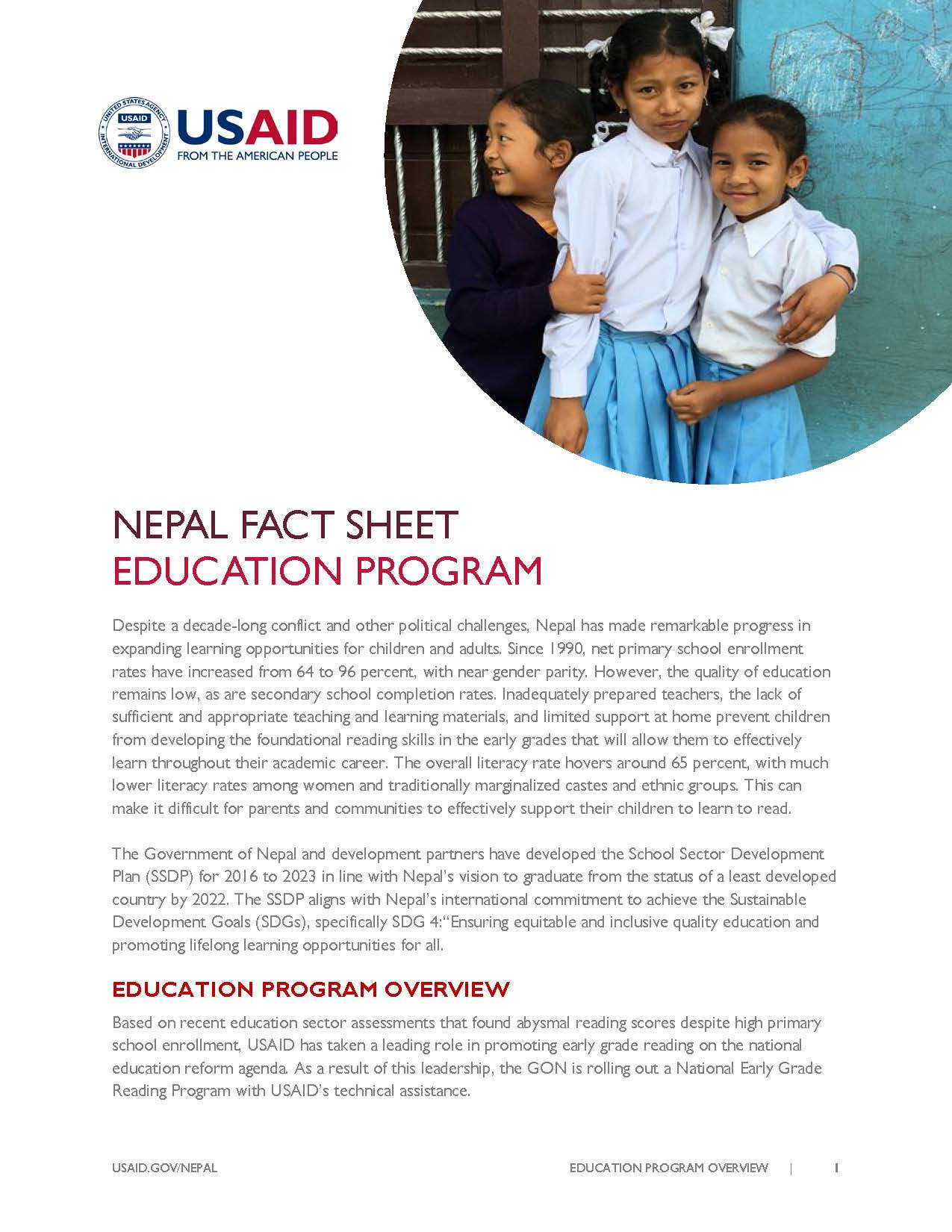Speeches Shim
Despite a decade-long conflict and other political challenges, Nepal has made remarkable progress in expanding learning opportunities for children and adults. Since 1990, net primary school enrollment rates have increased from 64 to 96 percent, with near gender parity. However, the quality of education remains low, as are secondary school completion rates. Inadequately prepared teachers, the lack of sufficient and appropriate teaching and learning materials, and limited support at home prevent children from developing the foundational reading skills in the early grades that will allow them to effectively learn throughout their academic career. The overall literacy rate hovers around 65 percent, with much lower literacy rates among women and traditionally marginalized castes and ethnic groups. This can make it difficult for parents and communities to effectively support their children to learn to read.
Fact Sheet: EDUCATION PROGRAM ![]() (pdf - 147k)
(pdf - 147k)
The Government of Nepal and development partners have developed the School Sector Development Plan (SSDP) for 2016 to 2023 in line with Nepal’s vision to graduate from the status of a least developed country by 2022. The SSDP aligns with Nepal’s international commitment to achieve the Sustainable Development Goals (SDGs), specifically SDG 4:“Ensuring equitable and inclusive quality education and promoting lifelong learning opportunities for all.
EDUCATION PROGRAM OVERVIEW
Based on recent education sector assessments that found abysmal reading scores despite high primary school enrollment, USAID has taken a leading role in promoting early grade reading on the national education reform agenda. As a result of this leadership, the GON is rolling out a National Early Grade Reading Program with USAID’s technical assistance.
USAID programs support the GON to improve the quality of education, restore access to education for children affected by the April 25, 2015 earthquake, and provide safe learning environments for adolescents to complete their education.
Quality of Education
USAID emphasizes improving early grade reading as the foundation for future learning. USAID´s 2014 Early Grade Reading Assessment for Nepal showed that 19% of 3rd graders could not read a single word of Nepali while only 12.8% of them were able to read with fluency and comprehension. The 2014 assessment also revealed that 55% of 2nd grade children whose mother tongue was not Nepali scored zero on reading assessments. Working together with the Ministry of Education, USAID will help one million young children acquire strong reading skills in grades one to three across 16 districts of Nepal. Particular attention will be paid to supporting literacy acquisition for Nepali second language learners.
Access to Education
In response to the April 25, 2015 earthquake, USAID supported the Government of Nepal to resume education services by establishing 1,045 temporary learning centers for over 93,000 students and providing learning and recreational materials, temporary latrine and handwashing facilities, and training for teachers to provide psychosocial support for children. To support recovery efforts, USAID plans to construct 250 transitional learning structures and strengthen local capacity to use data to make informed decisions on reconstruction plans.
Safe Learning Environments
USAID and UNICEF are implementing the Zero Tolerance, Gender-based Violence-free school project, which aims to reduce the prevalence of school-related gender-based violence in Nepal and promote equitable learning outcomes for adolescent girls and boys. The Zero Tolerance project operates in 200 schools in four districts in the central Terai region where child marriage in prevalent. A recent project baseline showed that while 72 percent of students have seen their peers involved in gender-based violence-related situations, only 55 percent of them have taken action against it. By raising awareness on gender-based violence at the school and community level, facilitating the reporting of incidents, and strengthening school linkages with justice sectors actors, the Zero Tolerance project will promote safe learning environments, so that students’ education outcomes can improve.


Comment
Make a general inquiry or suggest an improvement.